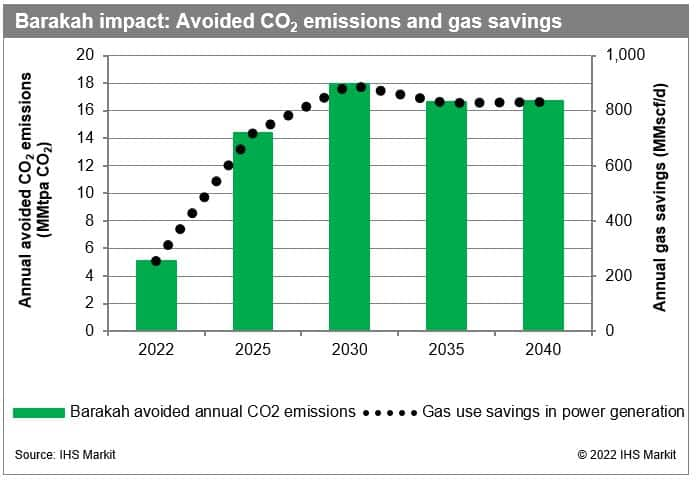Customer Logins
Obtain the data you need to make the most informed decisions by accessing our extensive portfolio of information, analytics, and expertise. Sign in to the product or service center of your choice.
Customer Logins
BLOG
Apr 19, 2022
ENEC’s second nuclear reactor train accelerates UAE national decarbonization and gas self-sufficiency goals
Nuclear as a net zero accelerator in the UAE
The successful commercialization on 24 March 2022 of the Emirates Nuclear Energy Corporation's (ENEC's) second reactor raises online capacity to 2.8 GW and supports expectations that all four reactors will be on-line by 2024, when they should account for over 20% of the integrated Abu Dhabi and Northern Emirates generation capacity and close to 40% of electricity generated.
- The ENEC Barakah nuclear facility is expected to be a significant contributor to the UAE's 2021 United Nations Climate Change Conference (COP26) commitment to be net zero by 2050: S&P Global's modelling projects that the facility will displace low-efficiency legacy gas generation and by 2030 eliminate up to 18 million metric tons per annum (MMtpa) of carbon dioxide (CO2) per year versus ongoing power generation with the current committed mix of plant. This alone should represent up to 25% of the UAE 2030 Nationally Determined Contributions (NDC) commitment for decarbonization made to the United Nations Framework Convention on Climate Change (UNFCCC) last year.
- When fully online, the nuclear plant should reduce gas consumption in 2030 by between 900 and 1,200 million cubic feet per day (or 155,000 and 205,000 thousand barrels oil equivalent per day)[1]: This will substantially support the UAE's target to be self-sufficient in gas supply by 2030, and along with Abu Dhabi National Oil Company's (ADNOC's) recent commitments for development of sour and unconventional gas fields, should place the nation in a strong position to advance plans for expansion of LNG export capacity at a time when the world is facing a major gas supply challenge.
- Clean energy certificates of origin for nuclear power from ENEC are now being offered, alongside those for renewable solar via the Abu Dhabi and Northern Emirates power utility, Emirates Water and Electricity Company (EWEC): These have been taken up by major players in the country such as ADNOC and Aldar, and imminently Emirates Global Aluminium (EGA), to support their own commitments to net zero. This is the first offering of clean nuclear certificates anywhere in the world, and the take-up suggests that the model may be replicable elsewhere. It is expected to support offerings of green aluminium, green steel and greener oil from UAE enterprises, all of which will serve as key examples to support net zero realization which can be leveraged as the UAE prepares to host COP28 in 2023.
- Both nuclear and renewables are expected to contribute to the future sustainability of power supply in UAE although nuclear offers baseload reliability whereas renewables are inherently intermittent. More aggressive incorporation of renewables by EWEC may be supported by nuclear but the overall optimization including necessary investments in grid reinforcement and in storage and possibly commitment to further nuclear development will need to be further assessed. In order to realize the full benefit of both nuclear and renewables capability EWEC will also need to push forward with its plans for the decoupling of older linked desalinated water and power production which could otherwise force some under-utilization in low power demand winter months.
Successful operation of the nuclear facility is a cornerstone of Abu Dhabi's clean energy strategy and is allowing Abu Dhabi's power utility EWEC (which is also responsible for Northern Emirates supply within the UAE) to substantially reduce its use of gas generation, and in particular to back-out low efficiency/older generation technology in its system.
S&P Global has applied its models of the UAE power demand and supply systems to assess the impact of the nuclear facility in terms of supporting the nation's decarbonization objectives and freeing up gas from use in power generation to support the national goals for self-sufficiency and potential further export development.

Our analysis indicates that the nuclear facility should support the long-term elimination of up to 18 million tonnes pa of CO2 compared to what might have been the case without its successful operation. In 2030 this should account for 25% of the targeted total UAE reduction planned within its latest NDC submission.
In addition, we estimate the gas savings from full four reactor operation, based on backing out operation of the least efficient gas-fired generation plants in the EWEC system, could be from 900 to 1200 million cubic feet per day (or 155 to 205 thousand barrels oil equivalent per day) [1], although these levels could be somewhat reduced longer term with significant step ups in renewables penetration and/or investment in more efficient gas generation. This gas demand impact will represent a major contribution towards ADNOC's strategy to support the UAE to be self-sufficient in gas by 2030 and potentially to be a net exporter.
Learn more about our research in gas, power, and climate solutions.
[1] The high-end of the range reflects a non-optimal power dispatch scenario where Barakah full-load generation would have been replaced equally by each operating gas-fired power plant in the EWEC grid.
---
Raul Timponi is an Associate Director on the Europe, Middle East, and Africa Energy Team, specializing in global power markets.
Silvia Macri is a Principal Research Manager, responsible for renewable and power market analysis in Africa and the Middle East.
Andy Barrett is a Senior Advisor with the Climate and Sustainability Consulting Team with an extensive background at the highest levels of the international energy business.
Posted on 19 April 2022
This article was published by S&P Global Commodity Insights and not by S&P Global Ratings, which is a separately managed division of S&P Global.
{"items" : [
{"name":"share","enabled":true,"desc":"<strong>Share</strong>","mobdesc":"Share","options":[ {"name":"facebook","url":"https://www.facebook.com/sharer.php?u=http%3a%2f%2fprod.azure.ihsmarkit.com%2fcommodityinsights%2fen%2fci%2fresearch-analysis%2fsuccessful-commercial-operation-for-enecs-second-nuclear.html","enabled":true},{"name":"twitter","url":"https://twitter.com/intent/tweet?url=http%3a%2f%2fprod.azure.ihsmarkit.com%2fcommodityinsights%2fen%2fci%2fresearch-analysis%2fsuccessful-commercial-operation-for-enecs-second-nuclear.html&text=ENEC%e2%80%99s+second+nuclear+reactor+train+accelerates+UAE+national+decarbonization+and+gas+self-sufficiency+goals+%7c+S%26P+Global+","enabled":true},{"name":"linkedin","url":"https://www.linkedin.com/sharing/share-offsite/?url=http%3a%2f%2fprod.azure.ihsmarkit.com%2fcommodityinsights%2fen%2fci%2fresearch-analysis%2fsuccessful-commercial-operation-for-enecs-second-nuclear.html","enabled":true},{"name":"email","url":"?subject=ENEC’s second nuclear reactor train accelerates UAE national decarbonization and gas self-sufficiency goals | S&P Global &body=http%3a%2f%2fprod.azure.ihsmarkit.com%2fcommodityinsights%2fen%2fci%2fresearch-analysis%2fsuccessful-commercial-operation-for-enecs-second-nuclear.html","enabled":true},{"name":"whatsapp","url":"https://api.whatsapp.com/send?text=ENEC%e2%80%99s+second+nuclear+reactor+train+accelerates+UAE+national+decarbonization+and+gas+self-sufficiency+goals+%7c+S%26P+Global+ http%3a%2f%2fprod.azure.ihsmarkit.com%2fcommodityinsights%2fen%2fci%2fresearch-analysis%2fsuccessful-commercial-operation-for-enecs-second-nuclear.html","enabled":true}]}, {"name":"rtt","enabled":true,"mobdesc":"Top"}
]}


